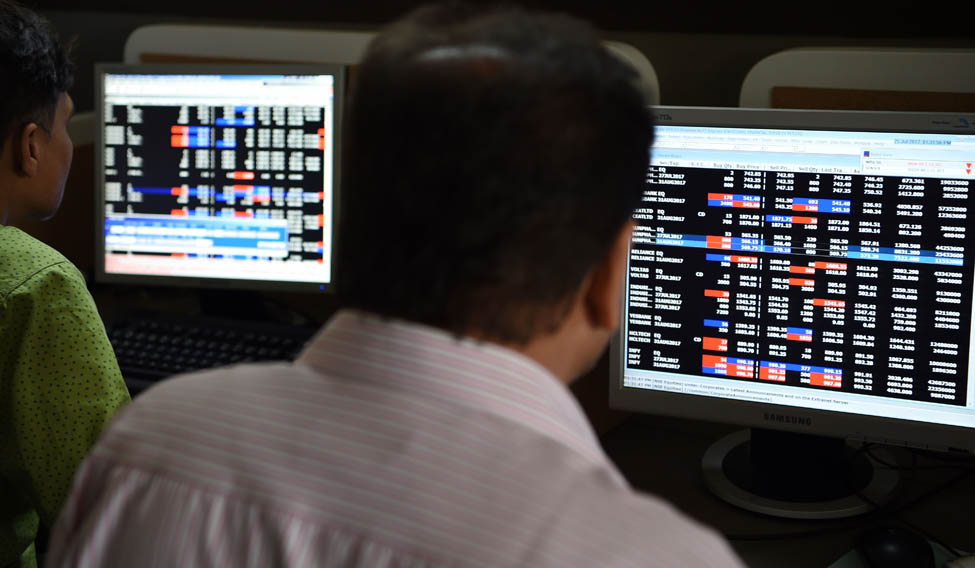India’s benchmark indexes logged gains of 2 per cent during the week as firm global market cues along with positive macro data back home aided sentiment. Market participants were also buoyed by expectations from the GST council meeting on Friday. The mid- and small-cap indexes outperformed the benchmark indexes, gaining between 2.5-3 per cent.
The Reserve Bank of India (RBI) policy announcement was on expected lines and did not have much impact on the markets. Automobile sales numbers also boosted sentiment as most companies posted good numbers ahead of the festival season.
The GST council meeting announced relief measures for exporters and SMEs as it reduced rates on 27 items and 12 services, and reduced the compliance burden. It hiked the threshold limit for the composition scheme to 10 million rupees. It also allowed other taxpayers with a turnover of up to 15 million rupees to file quarterly returns. The increase in threshold would bring in many more small businesses within its ambit and decrease the compliance burden.
A slew of measures were announced for exporters facing working capital issues such as quicker refunds and an e-wallet facility. Also bringing relief for the gems and jewellery industry, PAN or Aadhaar would not be mandatory if the value of the jewellery bought is above 50,000 rupees.
Overall, the meeting brought some relief especially for marginal GST assessees and a larger relief for exporters. Market expectations seemed higher looking at a near 100-point boost on the Nifty.
Automobile sales numbers were healthy in September, helped by a good monsoon and increased production of BS-IV compliant vehicles and a pick-up in exports. Lower GST impact combined with fears of increased cess also led to buying in early September. The early festival season also aided growth numbers. The increase in cess for mid-sized to luxury cars will possibly affect sales in October.
In response to the hue and cry over rising retail fuel prices, the government cut excise duty of 2 rupee per litre and requested state governments to follow suit by reducing VAT.
The RBI monetary policy review offered no surprise for the markets as almost all participants were expecting the status quo. It kept the repo rate unchanged at 6 percent and cut its GDP forecast, revising it down to 6.7 per cent this year as against the 7.3 per cent projected in August.
At the time when mutual fund assets under management are close to 20 trillion rupees and growing at a healthy pace month-on-month, market regulator SEBI has come out with rules to streamline schemes. It asked mutual funds to categorise schemes within five baskets - equity, debt, hybrid, solution-oriented and others - a move that will weed out the practice of multiple funds being launched on similar themes. SEBI has also defined market cap criteria for large-, mid- and small-caps.
Meanwhile, the SEBI-appointed Kotak panel has proposed more powers for independent directors, limiting chairmanship to non-executive directors, and a greater focus on transparency and disclosures to improve corporate governance. The recommendation covers areas such as composition of the board, the make-up of board committees, treatment of subsidiaries, information sharing with promoters and related-party transactions, audit evaluations, and conduct of annual general meetings.
On the macro front, the Nikkei India Services PMI index rose to 50.7 in September from 47.5 in August, signalling a return to growth of output. Manufacturing PMI remained unchanged at 51.2. Annual infrastructure output grew 4.9 percent in August compared with a revised 2.6 percent growth in July.
In the coming week, markets on Monday are initially expected to react to announcements by the government after the GST council meeting on Friday. The second-quarter earnings season kickstarts with some prominent names such as TCS, Kotak Bank, IndusInd Bank set to unveil their results.
However, markets will also be wary as North Korea prepares for a possible missile launch on Tuesday, the anniversary of the founding of the ruling Korean Workers Party.
On the macro front, the government will announce IIP figures for August on Thursday. CPI inflation data for September is also due the same day. On the global front, the Federal Open Market Committee (FOMC) will issue the minutes of its last meeting on Wednesday.
Whenever a country passes through a slowdown with low capex resulting in abysmal credit growth, the economy cannot grow. Excessive consumer spending coupled with low employment growth and utilization of easy credit is another cause of worry in India. To shore up resources to some extent, the government has directed PSUs to step up capex, increase dividends and may possibly push them to increase recruitment. Higher dividends may be beneficial to investors in the short run, but this should also make them wary of the PSU sector.
Overall, the Nifty is in the range of 9,600 to 9,940. We could see some correction on Monday morning as expectations from the GST council meet were not fully met.





